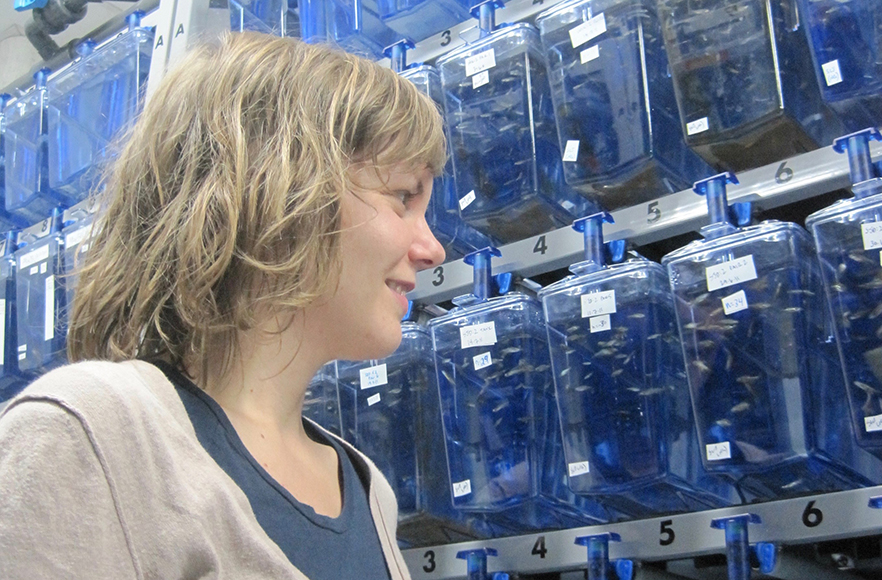Tuesday 30 August 2022 2:30pm

Dr Sheri Johnson with zebrafish in the Otago Zebrafish Facility. Image supplied.
Zebrafish dads make sure their offspring are equipped to deal with environmental challenges, University of Otago researchers have found.
In a study, published in the highly-ranked BMC Biology, the group found zebrafish fathers who were exposed to low oxygen levels in water passed information on to their offspring to help them cope in such conditions.
Senior author Dr Sheri Johnson, of the Department of Zoology, says hypoxia is a major challenge for aquatic species due to the rise of dead zones – areas where oxygen is so low life cannot survive.
“With ongoing climate change, which can increase the risk of hypoxia in aquatic environments, it is now more important than ever to understand how different aquatic species respond to environmental hypoxia,” she says.
The researchers found paternal hypoxia exposure produced offspring that were more tolerant to low oxygen and caused a complex of hemoglobin genes (that encode the key proteins involved in oxygen transport) to be turned on more in the offspring, thus improving their chances of survival in the low oxygen environment.
“Studies are increasingly demonstrating that parents or ancestors may provide offspring with increased tolerance to environmental challenges, such as food shortages, carbon dioxide, salinity, temperature, and, in this case, hypoxia.
“This sort of transgenerational acclimation will play a key role in the ability of animals to cope with changing environmental conditions, like climate change.”
Dr Johnson says not all species will respond this way, and it is important to find those which can’t, as well as better understand the mechanisms involved.
The group hopes to extend this research to look at the potential for transgenerational acclimation in New Zealand fishes.
The research was supported by a prestigious Marsden Grant and involved researchers spanning both the Division of Sciences and Health Sciences at Otago, with collaborators at the University of Auckland and University of New South Wales.
Publication details:
Paternal hypoxia exposure primes offspring for increased hypoxia resistance.
Alexandria Ragsdale, Oscar Ortega Recalde, Ludovic Dutoit, Anne A. Besson, Jolyn H. Z. Chia, Tania King, Shinichi Nakagawa, Anthony Hickey, Neil J. Gemmell, Timothy Hore and Sheri L. Johnson
BMC Biology
DOI: 10.1186/s12915-022-01389-x
For more information, please contact:
Dr Sheri Johnson
Department of Zoology
University of Otago
Email sheri.johnson@otago.ac.nz
Ellie Rowley
Communications Adviser
University of Otago
Mob +21 278 8200
Email ellie.rowley@otago.ac.nz
